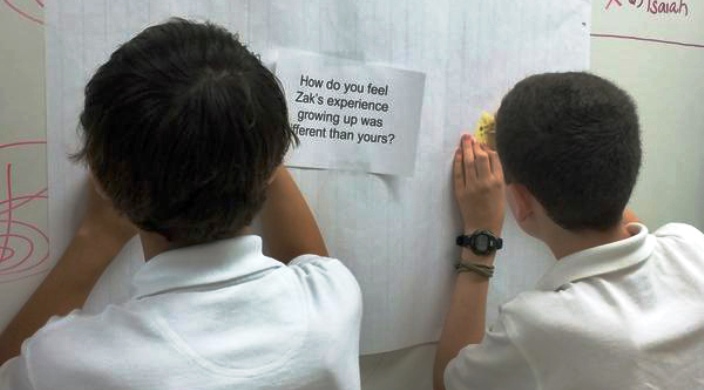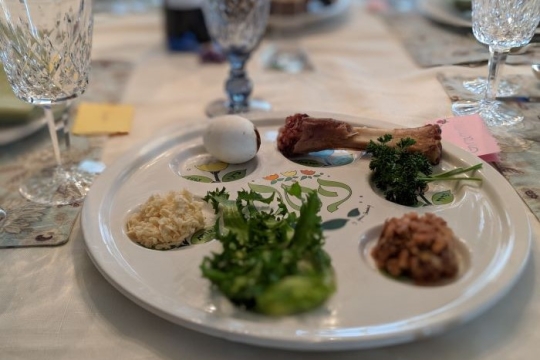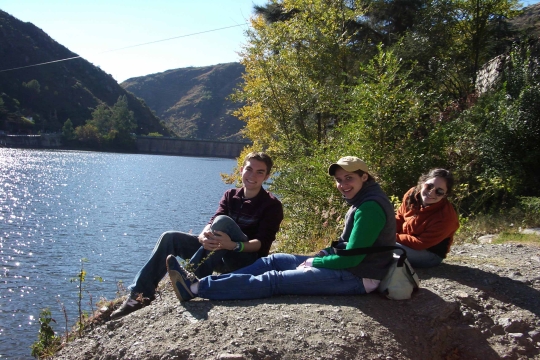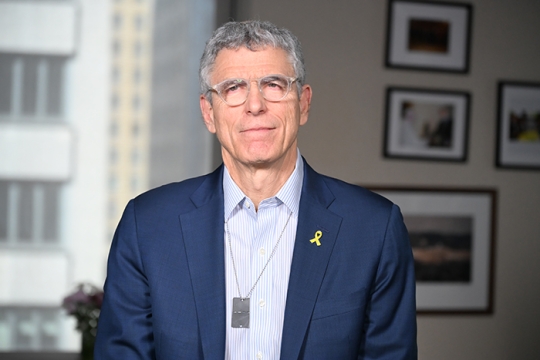From a Terrorist’s Son, Jewish Students Get a Lesson in Empathy

It’s not often I can draw from a Saturday Night Live skit to help teach my students a lesson at Atlanta’s Davis Academy, where I am an educator. This past summer at URJ Camp Coleman, one of my colleagues constantly quoted and imitated Kristin Wiig’s “Target Lady” character’s skits, proclaiming in her histrionic, high-pitched voice, “Stereotype busted!” Although this pop culture reference may have gone over the heads of most of my 7th grade students, the use of the phrase prompted a flood of responses to this question: “Where do you learn stereotypes, and how can we bust ‘em?”
I’m always amazed at my students and the responses they provide to any of our questions, but I’ve never seen them quite so affected as the day we asked this one. Maybe it’s because they’ve never heard a story like the one they did that day.
Just a few days before the anniversary of 9/11, a colleague forwarded over a powerful TED talk. It told the story of Zak Ebrahim, a 30-year-old peace activist born to well-known jihadist Sayyid Nosair. In 1990, Nosair shot and killed the leader of the Jewish Defense league, and in 1993, he helped plan the bombing of the World Trade Center. His son Zak, who escaped and persevered against his father’s violent heritage, published The Terrorist’s Son, a memoir written about forging his own path toward a peaceful existence.
Zak Ebrahim’s story of courage, bravery, and compassion was exactly what my colleagues and I wanted our students to learn. His resilience and ability to combat hate and embrace acceptance were lessons our kids could grow from and relate to in the context of a Beit Midrash, which is essentially a “break” from their regular curriculum – to learn for learning’s sake. During these once-monthly sessions, we teach lessons that focus on topics related to values, holidays, and moral development.
With a little framing from Sister Hazel’s song “Change Your Mind” (a little college inspiration from me!), students were primed to think about altering their perspective on stereotypes. Would it be as easy as Sister Hazel’s lyrics made it seem? What kind of changes were they going to be talking about?
Students watched the TED Talk with rapt attention, gasping when they realized how different Zak’s life could have been if he had joined his father’s terrorist group. After watching the video, they had a chance to debrief and then do a “chalk talk” with sticky notes, answering the following prompts:
- Where does your identity come from?
- Where do you learn stereotypes, and how can we bust them?
- How do you feel Zak’s experience growing up was different than yours?
- How was Zak’s childhood the same as yours?
- Who in your life has been a bad influence, and how have you risen above?
- How was Zak empathetic?
- Why was he able to be empathetic?
- How could you be more open and welcoming to your peers who have struggled like Zak has?
The excessive chatter that usually courses throughout classes and hallways came to a complete lull. As the kids focused fastidiously on the prompts, many even asked for extra sticky notes to add to the discussion.
I attended just one of the many lessons that were taught to every grade throughout the day. In the 7th grade class, you could literally hear a pin drop in the room. Kids were having serious discussions, whispering to some of their classmates about this question or that. I tweeted a few pictures of their work and even got a response from Zak Ebrahim himself.
The whole day gave me a brighter hope for our future. If we teach kids these lessons before they encounter stereotypes, we build up their awareness. We move closer to a chance for a more peaceful and understanding existence.
As if the day wasn’t already inspiring and exciting enough, a TED staffer contacted me for an interview about the experience and the lesson. I referred to it as an “empathy paradise,” which you can now read about on the TED Blog, alongside Zak's story. The piece closes with a quote from Zak, who said of our program, “Beautiful and humbling. This is my dream.” It was ours, too.
Related Posts

The Nevas Family's Enduring Passover Tradition: A Celebration of Freedom, Justice, and Community

Five Ways Adults Can Support Jewish Teen Mental Health


